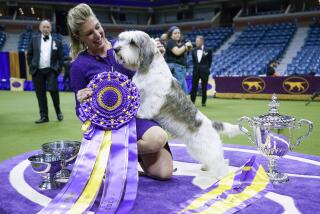Cat Show Competition Helps to Scratch Up Money for Boy Scouts
- Share via
It was Igor’s first show and he had just won a blue ribbon, despite his unknown heritage and early life spent at the pound three years ago. In response to victory, he curled up and fell asleep.
But his owner, Janet Johnson, more than made up for Igor’s nonchalance.
“I was floored,” Johnson said. “I have all the wrong types of combs. I don’t know how to groom him. I don’t even know the show rules.”
On a whim, the Laguna Beach woman entered Igor in Saturday’s championship and household cat show, sponsored by the West Shore Shorthair Cat Club. More than 250 cats are competing in the two-day show at the Orange County Fairgrounds, a fund-raiser for county Boy Scouts.
To her surprise, Igor--rescued from the pound in January, 1984, a day before he was to be put to sleep--won for best household pet.
Johnson was one of a handful of novices showing unregistered pets at Saturday’s show. Most of the entrants, however, were serious competitors who go to shows every weekend, some spending up to $30,000 a year traveling on “national campaigns.”
“I’m addicted. I love it,” said Carolyn Ross, a campaigner from North Hollywood. “It’s a hobby that requires full-time work. You get home from one show and you have to pack to go to another.”
Ross began showing Persian cats, which cost up to $5,000 apiece, last June. This weekend, she was showing two of her eight cats, Humdinger and Snowchief.
In between judgings, the two cats sat in cages covered with elaborate gold and white lace and feather covers. Inside, there were cat-size beds, silver bells and toys.
‘Just Like Little Kids’
“It’s show business, it needs a little dazzle,” Ross said. “They’re just like little kids. They need toys, too. Why not go to the trouble?”
Cats compete for ribbons, class designations and national rankings. A cat who wins six winner’s ribbons is designated a champion; a cat that defeats 200 other champions is designated a grand champion. With each win a cat also receives points, used to determine national rankings.
To many cat owners, strategy and timing is everything.
“You have to wait until the proper time. You don’t want to enter cats that aren’t going to win,” Ross said. “I have several cats going through the ‘uggies,’ an awkward stage. They more or less have to be perfect when you show.”
For the campaigner, showing cats can be very competitive. Often the same cats--and the same owners--are competing against each other week after week.
“They’re dangerous people, very competitive, very catty,” Ross said of show cat owners. “It seems like if you’re not winning, everybody likes you.”
“There’s a little bit of politics involved,” admitted Connie Stewart of Los Angeles, a seven-year veteran of the national cat show circuit who owns 15 cats. This weekend, Stewart was showing six of her own animals and a cat that belongs to a friend in Boston.
Larger Shows Better
“This is my territory, so it’s more advantageous for me to show it here,” she said of her friend’s cat.
Some weekends, Stewart will register for three different shows, although she only attends one. She calls ahead to find out which has the most most entrants, since the larger the show, the more points a winning cat is awarded.
“The national campaigners are out there every weekend,” Stewart said. “It takes $20,000 to $30,000 to campaign a national kitty.”
Winning cats are awarded ribbons but no prize money, although owners can charge higher prices for the kittens of winning cats. But many owners say the biggest reward is the joy of showing beautiful animals.
“We have so much fun doing this. It is just a thrill,” Stewart said. “I spend a lot of money doing this, so I better have fun.”
As for the sleeping Igor, Johnson said, he may be in future shows “if he enjoys it.”
More to Read
Sign up for Essential California
The most important California stories and recommendations in your inbox every morning.
You may occasionally receive promotional content from the Los Angeles Times.










